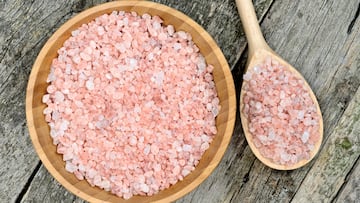Forget oil and butter: This is the latest cooking trend for frying food
A little-known technique that has been used for centuries in Asian cuisine has been brought to the attention of TikTok.

Let’s face it, there’s nothing worse that preparing a fry-up only to find out at the last minute that you have run out of oil, and there’s nothing else (butter, lard) in the cupboard to use as an alternative.
However, all is not lost. There is another everyday food cupboard staple that works just as well for frying that might come as a surprise to some people as it is not liquid-based.
Hot salt and hot sand frying are common cooking techniques throughout Asia and other parts of the world
— Science girl (@gunsnrosesgirl3) April 20, 2025
pic.twitter.com/Tk8hExlAWv
Deep frying food in salt
Earlier this year, Brazilian food influencer Roice Bethel shared a hack which quickly went viral, amassing over 16 million views on TikTok. Bethel demonstrated who you can ‘deep fry’ dry ingredients such as popcorn, raw nuts (peanuts, almonds) ... etc. using salt to conduct heat.
Bethel added a kilo of rock salt to a pan and heated it up to 300 degrees. “When the salt turns that golden brown color, that’s how you know you’re ready to cook,” he explained. By using a large amount of salt, he adds, it “acts similar to a liquid, you can essentially deep fry in it”.
In his video, Bethel tossed a handful of popcorn kernels into the hot salt, put a lid on the pan and watched as they puffed up and popped - just as they would do in a traditional stovetop pan with hot coconut oil.
@roicebethel Bonus Points if you can guess what part of the world this technique comes from. In English it’s called salt frying! #easyrecipe #foodhacks #foodscience #cookinghacks #deepfried
♬ original sound - roicebethel
The video drew hundreds of comments, most of them concerned about ingesting high levels of salt which is very bad for raising blood pressure. But the salt is actually discarded and the cooked food is left with just a mild, salty taste.
The method only works with dry ingredients, so don’t be tempted to try it out with chicken wings or burgers. It’s also important to use a cast-iron skillet or carbon steel wok, but do not use a Teflon-coated nonstick pan as the salt reacts with the nonstick coating and can damage your pan. Coarse sea salt works best as it is easier to sift off than the fine-grained table salt and is also less likely to absorb moisture.
Hot salt and hot sand frying are common cooking techniques throughout Asia and other parts of the world
— Science girl (@gunsnrosesgirl3) April 2, 2025
pic.twitter.com/M77IAhhhA9
Using salt and sand to cook in Asia
Bethel isn’t the first to explore using salt to transfer heat to food. It’s been used for centuries in Asian countries such as Bangladesh, Nepal, China and India.
In India, Fryum snacks are made this way typically using tapioca or potato starch. Peanuts are dry roasted using the same method in Bangladesh. And the salt can be reused, making it a very cost-effective process compared to traditional frying with oil, which usually has to be discarded after just one use.
Related stories
Get your game on! Whether you’re into NFL touchdowns, NBA buzzer-beaters, world-class soccer goals, or MLB home runs, our app has it all.
Dive into live coverage, expert insights, breaking news, exclusive videos, and more – plus, stay updated on the latest in current affairs and entertainment. Download now for all-access coverage, right at your fingertips – anytime, anywhere.
Complete your personal details to comment